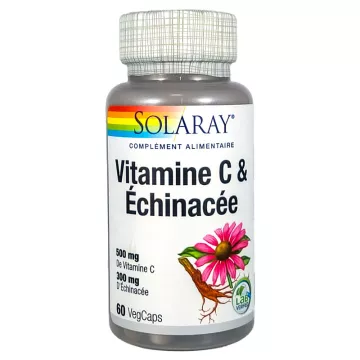
What is echinacea and why is it so valuable in phytotherapy?
Echinacea is a medicinal plant native to North America, widely used for its immunostimulant, antiviral and anti-inflammatory properties. It is mainly recommended for strengthening natural defenses, preventing winter infections and accelerating the healing of respiratory ailments.
Rich in alkamides, polysaccharides and flavonoids, echinacea is an ideal ally for boosting the immune system, fighting infection and reducing inflammation. It is commonly consumed in the form of herbal teas, liquid extracts, capsules or tablets.
What are echinacea's benefits for the immune system?
Echinacea is particularly appreciated for its protective and stimulating action on immunity. Its main benefits are as follows
Reinforces natural defenses: stimulates production of white blood cells, essential for fighting infection.
Prevents winter infections: A course of treatment at the start of the cold season helps reduce the frequency and duration of colds and flus.
Speeds recovery: In the event of infection, it helps reduce the severity of symptoms and shorten convalescence.
Antiviral and antibacterial: Inhibits the spread of viruses and limits the proliferation of pathogenic bacteria.
Anti-inflammatory properties: soothes sore throats, sinusitis and bronchitis through its action on mucous membrane inflammation.
Is echinacea effective against colds and flu?
Yes, numerous scientific studies have confirmed that echinacea is effective in :
Reduce the intensity of cold symptoms (sneezing, congestion, headaches).
Reduce the duration of respiratory infections by stimulating immunity.
Prevent relapses in people prone to frequent colds.
Tip: For maximum effectiveness, echinacea should be taken at the first signs of immune weakness, or as soon as the first cold symptoms appear.
What other benefits does echinacea have for the body?
Echinacea does more than prevent respiratory infections. It also has beneficial properties for
Skin health: It accelerates the healing of small wounds and soothes skin inflammations such as eczema or acne.
Combating urinary tract infections: Thanks to its antibacterial action, it can be used as a complement to conventional treatments.
Managing oxidative stress: Rich in antioxidants, it helps combat cellular aging.
What forms does echinacea come in?
Echinacea is available in a variety of forms to suit individual needs and preferences:
Infusion or decoction: Ideal for gentle, gradual absorption of active ingredients.
Liquid extract or mother tincture: Concentrated and effective, it's easy to dose.
Capsules or tablets: Convenient for daily use and precise dosage.
In spray or lozenges: To soothe sore throats and strengthen the throat against infections.
What is the recommended dosage for echinacea?
Dosages vary according to the form used:
In infusion: 1 to 2 cups a day for prevention, up to 3 cups in times of infection.
Mother tincture: 20 to 30 drops, 2 to 3 times a day, diluted in water.
Capsules: 300 to 600 mg daily for prevention, up to 1,200 mg in case of infection.
It is advisable not to exceed 8 weeks of consecutive treatment to avoid habituation.
Are there any contraindications to taking echinacea?
Echinacea is well tolerated, but certain precautions must be taken:
People allergic to plants in the Asteraceae family (daisy, dandelion) should avoid its use.
Autoimmune diseases (lupus, multiple sclerosis): As echinacea stimulates the immune system, it could aggravate these pathologies.
Pregnant and breast-feeding women: As a general precaution, use is not recommended.
Children under 3: Use must be supervised by a health professional.
If in doubt, seek the advice of a doctor or pharmacist before starting a course of treatment.
When should I start an echinacea cure?
For effective prevention, we recommend starting a cure in autumn or during periods of fatigue.
Prevention: a 3 to 6-week course of treatment to stimulate the immune system before winter.
As soon as the first symptoms appear: take immediately to shorten the duration of the infection and reduce the intensity of symptoms.
It is advisable to alternate courses of treatment with periods of no intake, to avoid over-dependence of the immune system.
Can echinacea be combined with other plants?
Yes, echinacea can be combined with other plants to reinforce its action:
With thyme: for enhanced action against respiratory infections.
With ginseng or eleutherococcus: to energize and stimulate the immune system.
With propolis and royal jelly: For a protective synergy against winter viruses.
These combinations potentiate the effects and diversify the action on the body.